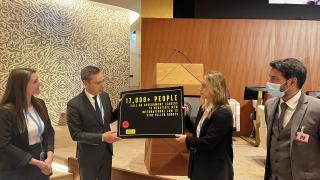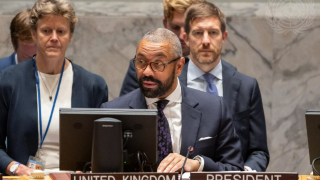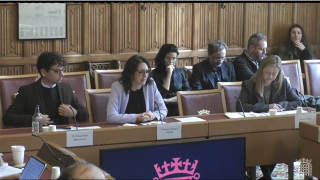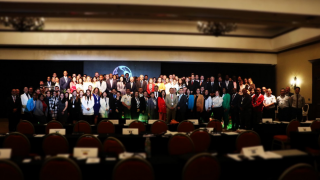
After last week's inconclusive meeting of governmental experts on the issue of Lethal Autonomous Weapons Systems, or "killer robots", all eyes turn to Geneva as states meet for a make-or-break week of meetings to decide how to address this issue.
Expectations around the world remain high that states at this week's Review Conference - a meeting that takes place once every five years - will take the opportunity to adopt a mandate to start negotiations of a legal instrument to regulate these weapons. This is the moment for states to work together to ensure that meaningful human control over the use of force is maintained, and to draw a legal and moral line against machines killing people – the ultimate form of digital dehumanisation.
While we remain optimistic that states will grasp this opportunity, warning signs emerged during last week's meeting of experts. On Wednesday 8 December, the Group of Governmental Experts finalised its report to be submitted to the Review Conference of the CCW. Despite the majority of states clearly calling for the negotiation of a legally binding instrument to address the risks posed by autonomous weapons, the Group was unable to agree on a way forward. The last day of the meeting saw a small group of states – including the UK, US, India and Russia (all of whom are already developing autonomous weapons) used the consensus rule to block progress towards regulation.
The final report made no recommendation regarding a mandate for future work, passing the decision on to this week's critical Review Conference, which concludes on 17 December.
Background
For 8 years, states have contended that the CCW is the appropriate forum to respond to the moral, ethical, humanitarian, security and legal risks that killer robots pose to society. The government of New Zealand recently added its support to the 66 countries who have explicitly called for a new legally binding instrument. The UN Secretary General, the International Committee of the Red Cross and Red Crescent, thousands of scientists, AI and robotics experts, and over 16,000 members of the public have called on government leaders around the world to start the negotiation of new international law.
If the Review Conference fails to adopt a negotiating mandate for a new law, the growing number of states committed to action on this issue will need to consider an alternative pathway, as we have seen take place successfully before with the landmines and cluster munitions treaty processes. Anything less falls short of the steps our policy makers need to take to ensure that technology plays a positive and responsible role in our society.
UNA-UK has campaigned on this issue since 2013 and we are a proud member of the award-winning global Campaign to Stop Killer Robots. As hosts of the UK chapter of the Campaign to Stop Killer Robots, UNA-UK helps coordinate advocacy work in parliament, universities and the tech sector working closely with partner organisations and experts across the UK. In the run-up to this meeting we wrote to the Secretary of State for Defence to challenge the UK to be on the right side of history and take urgent action to outlaw these weapons before it is too late.
BBC Reith Lecture
This year's Reith Lectures - the BBC's flagship series to advance public understanding and debate about significant issues of contemporary interest - included a highly informative exploration of the debate around LAWS. The series was delivered by Professor Stuart Russell, who raised the alarm on this issue and called on states at the UN to ban these weapons before they become widely available:
"We could have small, lethal autonomous weapons costing between five and $10 each and if you allow those to be manufactured in large quantities, then it’s like selling nuclear weapons in Tesco. They’ll be available in the international arms market for whoever [can pay] - the price of one F35 you can buy 20 million weapons. That’s not a future that makes sense to me."
Read more and take action
- Follow @uk_robots and @bankillerrobots on Twitter for commentary and analysis of the UN meetings across the week
- Read the The UK Campaign to Stop Killer Robots’ letter to Government here
- Read a transcript of the BBC Reith Lecture on LAWS here
- Sign the global campaign petition and learn more about the issue here
Image: Stop Killer Robots & Amnesty International presented Ambassador Hwang, President of the Review Conference, in Geneva with a petition signed by over 17000 people (c) Campaign to Stop Killer Robots






